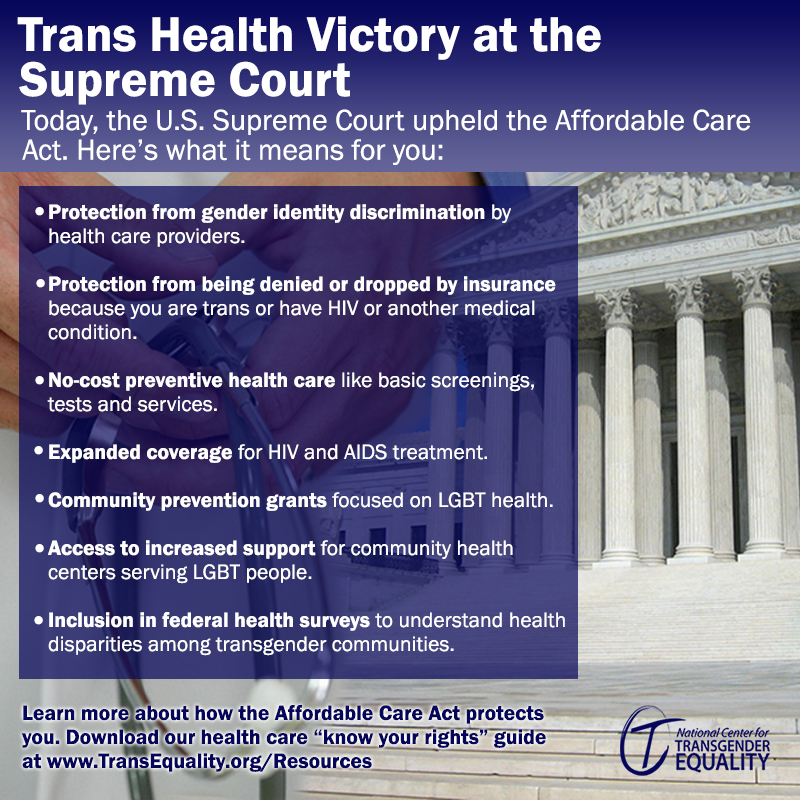Trans Health Care Rights on Trial
Image

In the coming days, the Supreme Court is expected to issue its ruling on the constitutionality of the Affordable Care Act (ACA). The National Center for Transgender Equality, along with other LGBT organizations, strongly believes that the ACA’s passage was instrumental in creating new health care rights for transgender and LGB community members. Not only does the ACA expand coverage for all Americans, but protects a vulnerable and disproportionately uninsured (and underinsured) population. Here is a quick reminder of what is at stake:
- Protection from sex discrimination in health care. The National Transgender Discrimination Survey found high rates of discrimination in a variety of health care settings, and shocking 19% of respondents reported being denied health care outright due to bias. For the first time, the Affordable Care Act prohibits discrimination based on sex – including gender identity – by any health care entity that receives federal funds. This critical new protection covers hospitals, clinics, doctor’s offices, and other health care facilities and programs that accept Medicare or Medicaid. You can report discrimination to the HHS Office for Civil Rights. You can read more about this part of the law in NCTE’s resource, “Health Care Rights and Transgender People.”
- Protection from being denied or dropped from insurance. Prior to passage of the Affordable Care Act, insurers refused to issue insurance to individuals because they were transgender, or because of a medical condition such as HIV/AIDS. No wonder that the National Transgender Discrimination survey found transgender people were less likely to be insured.Plans could also decide to cancel a person’s coverage at the very moment they most needed medical care. Starting in 2014, the health care law will ban these unfair practices, and these protections are already in place for those under 19. In addition, the law allows young people to stay on their parent’s plan until they are 26, provides premium credits to help individuals buy insurance, and expands the Medicaid program to ensure access for those who can’t afford it.
- No-cost preventive care. Half of respondents in the National Transgender Discrimination Survey reported they had delayed preventive care because of cost – including 37% of those with private insurance. Under the Affordable Care Act, insurance plans must cover a range of key preventive services, from vaccinations, to blood pressure, cholesterol and osteoporosis screenings, to mammograms and pelvic exams, to testing and counseling for HIV and sexually transmitted infections – without no cost-sharing.
- Ensuring access to HIV and AIDS treatment. Numerous studies confirm that transgender people are disproportionately impacted by HIV/AIDS; in the National Transgender Discrimination Survey, more than 2.6% respondents reported they were HIV-positive, compared to 0.6 for the general population. The Affordable Care Act expands access to coverage and care for people living with HIV and AIDS in numerous ways: by making it illegal to deny or cancel coverage to people with HIV or AIDS or charge them higher premiums; by eliminating annual and lifetime limits that keep people from getting the care they need; by making private insurance more affordable; expanding Medicaid; and closing the Medicare donut hole that has made medications unaffordable for many. NCTE and 15 other groups submitted an amicus brief to the Supreme Court arguing that the law is absolutely critical in the fight against HIV/AIDS.
- Supporting providers for our communities. The law increases support for community health centers across the country, including the growing number of federally-qualified health centers that serve the LGBT community. The law also invests in the health care workforce, nearly tripling the size of the National Health Service Corps, whose members provide primary care to communities that need it most and are now receiving training on better serving LGBT patients.
- Collecting data on LGBT health. One of the biggest obstacles to improving health for trans and all LGBT people is the lack of high-quality data on the health of our populations.. The health care law calls for expanding the collection of demographic data in federal health surveys, to help better understand the scope, causes and solutions to health disparities affecting different populations. In implementing the law, the Administration has already moved to include questions related to sexual orientation in major surveys, and has committed to develop questions on gender identity for use in the coming years.

